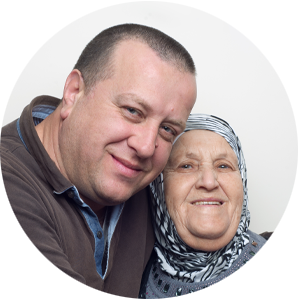What you need to know about getting diabetic retinopathy treatment in Brooklyn and Manhattan
Are you suffering from diabetic retinopathy?
These challenges may sound familiar…


You’re at risk of going blind
You have developed diabetic retinopathy as a result of high blood sugar levels due to your diabetes. This means you’re at risk of going blind if an ophthalmologist does not treat you.
You might feel down and anxious
The stress of living with diabetes can contribute to changes in mood and place emotional strain on your personal life. The additional worry of a visual impairment adds to the reality of complications.
Diabetes dictates the day
The never-ending demands of diabetes can be exhausting. You might need to eat carefully, exercise, monitor blood glucose, schedule and plan medications. To make matters worse, you’re now likely experiencing the symptoms of a progressive eye disease.
Take control of your health
You don’t need this constant battle with your body. You deserve to live comfortably and in control. With our range of treatments, we can not only slow and stop the progression of your condition, but we can hopefully restore any damage to your eyes and help you manage your diabetes moving forward.
Diabetic retinopathy explained
In these toggles we explain what you need to know about diabetic retinopathy
Diabetic retinopathy is an eye disease that occurs in patients with diabetes.
It is the most common form of diabetic eye disease and usually only affects people who have had diabetes for a significant number of years.
There are no common symptoms present during the early stages of diabetic retinopathy. As it progresses, symptoms can include:
- Sudden changes in vision
- Blurred vision
- Eye floaters and spots
- Double vision
- Eye pain
- Seeing blank or dark areas in your field of vision
- Poor night vision
- Colors appearing faded
Uncontrolled glucose or blood pressure levels can cause diabetic retinopathy.
There are three stages to diabetic retinopathy:
Stage 1: background retinopathy
At this stage, tiny bulges appear in the blood vessels in the back of your eyes which may leak small amounts of blood. At this stage, your sight isn’t affected.
Stage 2: pre-proliferative retinopathy
At this stage, more severe and widespread blood vessels bleed into your retina, and your vision can be affected.
Stage 3: proliferative retinopathy
At this stage, new blood vessels and scar tissue form on your retina. This can cause significant bleeding and lead to retinal detachment where the retina pulls away from the back of the eye. There’s a very high risk you could lose your vision.
Diabetic maculopathy
In some cases, the blood vessels in the part of the eye called the macula (the central area of the retina) can also become leaky or blocked. This is known as diabetic maculopathy.
If this occurs, your vision could be affected.
We can diagnose diabetic retinopathy by performing a comprehensive eye examination to assess your vision and eye health.
For this exam, we use eye drops to dilate your pupils so that we can clearly see inside your eyes.
During the exam, we look for:
- Abnormal blood vessels
- Swelling, blood or fatty deposits in the retina
- Growth of new blood vessels and scar tissue
- Bleeding in the clear, gel-like substance that fills the center of the eye (vitreous)
- Retinal detachment
- Abnormalities in your optic nerve
We will also perform the following tests:
- Fluorescein angiography
- Optical coherence tomography
Treatment aims to slow or stop the progression of the condition and depends on the type of diabetic retinopathy you have and how severe it is.
If you have stage 1 or 2 diabetic retinopathy, you may not need treatment right away. We can closely monitor your eyes to determine when you might need treatment and help you improve your diabetes management. Good blood sugar control can usually slow the progression.
If you have stage 3 diabetic retinopathy or diabetic maculopathy, you’ll need prompt treatment.
Depending on the specific problems with your retina, options may include:
Laser treatments
- Photocoagulation
- Panretinal photocoagulation
Intravitreal eye injections
The medication, vascular endothelial growth factor (VEGF) inhibitors, can help stop the growth of new blood vessels.
Eye surgery
Pars plana vitrectomy is a surgical procedure that can restore vision in diabetic retinopathy by removing the natural vitreous that has become clouded by leaking blood vessels and replacing it with clear fluid.
Discover your options to get your eyes back in top shape
Call us and we’ll help you take the steps you need to repair your eyes
How to get help
These 3 easy steps allow you to stop worrying about your eyes
STEP 1:
Call us to get an appointment
Give us a call at (718) 630-1010 and we’ll answer the questions you have so that we can recommend the best next step.
STEP 2:
Visit us
Whatever the issue, we’ll provide you with the exceptional care that your most precious sense deserves.
STEP 3:
Get the help you need
Whether it’s a quick intervention or a long-term treatment plan, we’ll guide you with compassion, every step of the way.
Affiliations and memberships
We are proud to be associated with these professional organisations
Got diabetes? Learn how to avoid unnecessary blindness
Discover what you can do to reduce your risk of diabetic vision loss
What our patients say
★★★★★
We’ve been getting 5-star reviews from savvy Brooklynites and New Yorkers for over 20 years


Dr.Khosrof is one of the most knowledgeable doctors in his field. My family and I have been his patients for years and he has never failed to provide us tip top service and always does what’s safest for us and our eyes…


I want to talk about Dr. Samer, he is extremely professional and kind and he has the latest equipment and great staff. He’s very caring about his patients and takes the time to explain.


Dr. Khosrof is an outstanding physician and surgeon with a great bedside manner. As a fellow Ophthalmologist, I have always been impressed by his talent.


Dr. Khosrof improved my eye sight from 20/400 to 20/80. I had previously see 2 other retina specialists and 1 optometrist and none of them were able to help me. He’s terrific!
More information on diabetic retinopathy
Educate yourself further about diabetic retinopathy by clicking the links below
An informative article on diabetic retinopathy, the symptoms and risks. Click here to read more.
This article goes over the specific stages of diabetic retinopathy that you may go through. Click here to read more.
A quick answer to a common question; what happens if you leave diabetic retinopathy untreated? Click here to read more.
Another helpful overview of diabetic retinopathy that includes what preventative measures should be taken. Click here to read more.
About the expert
Dr. Samer Khosrof | Ophthalmologist
Dr. Samer Khosrof is a top eye surgeon in New York City with over 25 years of experience treating complex eye conditions such as diabetic retinopathy and age-related eye conditions.
His extensive experience enables him to stay on top of the latest treatments available. He believes in the efficacy of medical technology and has the expertise to deploy the newest diagnostic and treatment techniques to treat his patients with 100% confidence.
When you become a New York Eye & Retina Clinic patient; you’re a Samer Khosrof patient first. This means he sees you before your surgery, he performs your surgery, and he provides your aftercare. In the end, you’re his patient, and he takes that responsibility very seriously.
































